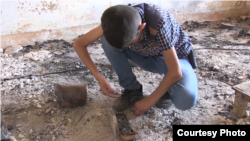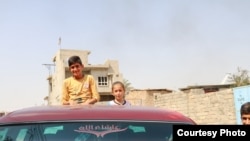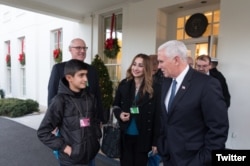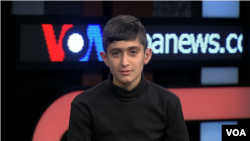Before Islamic State militants attacked Karemlash in northern Iraq, Noeh Binoo, 13, was known as a champion marbles player in his hometown. He had a stash of over 6,000 marbles of many sizes and colors that he'd won from other children in the town.
"Most of them are now buried in the ashes of my bedroom," Binoo told VOA in Washington after he met with several U.S. and U.N. officials to request support for his community following the removal of IS fighters.
Karemlash is 29 kilometers (18 miles) southeast of Mosul. It was home to about 10,000 Christians until IS took over in August 2014. IS fighters looted houses and monasteries before setting ablaze dozens of buildings.
Binoo, his parents and six siblings were among the lucky ones who were able to flee just a few hours before IS attacked. Some in that town were not as lucky and fell victim to IS atrocities.
"I was very scared that day. Daesh killed everyone who stayed," he said, using the Arabic acronym for IS fighters. "They were murders and thieves."
Many yet to return
The predominantly Christian town was recaptured during a U.S.-backed Iraqi operation in late 2016.
However, only 40 percent of Karemlash's residents have returned. The rest remain in refugee camps in northern Iraq.
Binoo and his family returned home in August after three years of living in a shelter in the Kurdistan region's capital, Irbil.
"I was very excited to return to Karemlash," he said. "But I was shocked to see my home, school and church burned down."
Binoo told VOA that the majority of the town's former residents want to return, but the ruin caused by IS needs to be fixed first.
Binoo said his visit to the U.S. was made on behalf of his town's residents to plead for the international community's support in reconstructing their wrecked homes.
"I told them we want to resume a new and peaceful life," he said after meeting several officials from the White House and State Department last week, including Vice President Mike Pence. "I asked them to help us rebuild our homes and achieve a lasting peace."
Binoo said he gave Pence several disfigured marbles he'd retrieved from the rubble of his home. "The vice president told me he hoped to return them back to me one day when this suffering becomes something of the past," he said.
After the meeting last Wednesday, Pence tweeted a photo showing him with Binoo and vowed, "Help is on the way!"
Change in aid policy
The U.S. government has expressed concern that Christian communities and other religious minorities persecuted by extremist groups did not receive an adequate share of the aid provided by governments and international organizations to help them quickly rebuild their homes.
Pence in October signaled that the U.S. would change its humanitarian aid policy, bypassing the U.N. and directly funding groups that are focused on religious minorities in the Middle East through the U.S. Agency for International Development.
"The United States will work hand in hand from this day forward with faith-based groups and private organizations to help those who are persecuted for their faith. This is the moment, now is the time, and America will support these people in their hour of need," Pence said in October during a speech in Washington at the annual summit of In Defense of Christians, an advocacy organization.
Kristin Wright of Open Doors USA, another Christian advocacy organization, said Christians and other minorities feel unsafe, even as IS militants are declared defeated in Iraq. She said most of those communities feel left out and marginalized with regard to post-IS reconstruction decisions.
Wright said her organization helped bring Binoo to the U.S. to put a face on those who have been traumatized by the IS atrocities.
"They want dignified living conditions and a role in the future of their society," Wright told VOA.
She said Binoo also presented a petition to the U.N. secretary-general's office with over 800,000 signatures collected by Open Doors USA from 142 countries. The petition calls for international protection of and support for the persecuted religious minorities in the Middle East.
Pleased by pledges
Binoo told VOA he was thrilled to hear pledges of support from the U.S. and U.N. officials to help Iraqis return to Karemlash.
He said that while he hopes to become either a popular soccer player or teacher when he grows up, his plan for now is to reunite with his friends and play marbles again.
"I lost all of my marbles because of Daesh. But I know I can win more of them again because I am No. 1 at playing," he said.







